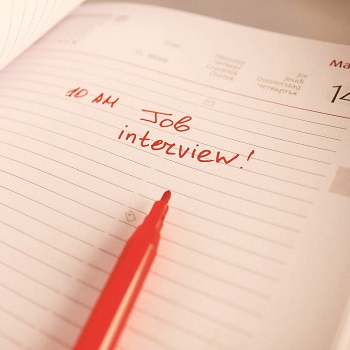Making the Best of Interviews
By Robert Parkinson
 In a recent radio show, China International Radio's Career Builders, I was asked to talk about the volume of Chinese job changing around the Spring Festival time and spoke mainly from the point of view of Chinese employees. It was a very interesting discussion. Unlike the situation in China, British employers barely worry about the "festive employee loss" issue. On my way back I thought about the topic from the different angle. HR Managers either recruit to fill a new role or to replace someone who is about to leave. In the busy hiring season I notice that the majority of HR managers are often so eager to interview candidates that they misjudge a lot of job applicants' performance in the interview process. To make the best of interviews, efforts shouldn't just come from interviewee. I think that it is a good idea to give some potentially-can-succeed candidates a second interview opportunity.
In a recent radio show, China International Radio's Career Builders, I was asked to talk about the volume of Chinese job changing around the Spring Festival time and spoke mainly from the point of view of Chinese employees. It was a very interesting discussion. Unlike the situation in China, British employers barely worry about the "festive employee loss" issue. On my way back I thought about the topic from the different angle. HR Managers either recruit to fill a new role or to replace someone who is about to leave. In the busy hiring season I notice that the majority of HR managers are often so eager to interview candidates that they misjudge a lot of job applicants' performance in the interview process. To make the best of interviews, efforts shouldn't just come from interviewee. I think that it is a good idea to give some potentially-can-succeed candidates a second interview opportunity.
The first principle is to make sure that HR staffs always notify candidates about the interview process and tell them the result on time. Failure to succeed at an interview is sometimes the result of sudden changes in the financial or personnel dynamics of the company. It has nothing to do with the quality of candidates. If you keep a senior managerial type candidate waiting for 3 months without any feedback, they will absolutely be angry with you. Remember the golden rule is to notify candidates as soon as possible after the interview. Instead of sending an email, I would suggest that candidates are notified by phone calls.
 Few HR people call candidates about the result of an interview, but it is a very important and indispensable step. Although nobody likes being rejected for whatever reasons, keeping candidates waiting makes it worse. In particular, promising candidates who are interested in your company might postpone or give up interview opportunities from other companies. If you forget or intentionally postpone letting them know, you will leave a poor impression of the professionalism of the HR department and the company. To follow up with the example of keeping a senior manager waiting for interview results, anger equals to distrust. Once they are angry with your ignorance, they rarely turn back to you even if you ask in a very nice way.
Few HR people call candidates about the result of an interview, but it is a very important and indispensable step. Although nobody likes being rejected for whatever reasons, keeping candidates waiting makes it worse. In particular, promising candidates who are interested in your company might postpone or give up interview opportunities from other companies. If you forget or intentionally postpone letting them know, you will leave a poor impression of the professionalism of the HR department and the company. To follow up with the example of keeping a senior manager waiting for interview results, anger equals to distrust. Once they are angry with your ignorance, they rarely turn back to you even if you ask in a very nice way.
I suppose that is also the major reason why there are sometimes complaints from recruitment consultants that HR Managers are sharp and brusque. It seems that some HR Managers and HR staffs behave in a less than professional way, making U-turns on candidates before and after the interview. While a 180°attitude change is likely to alienate, a friendly approach will produce a better result in the long term.
 If the interviewee fails to bring out his or her best performance, HR staff should not be judgmental. It is the best to finish the interview by telling a candidate how long he or she will have to wait for the result. Some interviewees might be too nervous or unprepared for the first interview, but sometimes they can show real potential with a precious second chance. The benefit for HR Managers is huge, too. If important positions suddenly become available â and this happens all the time â it is often effective to look back at old contacts instead of searching for new people.
If the interviewee fails to bring out his or her best performance, HR staff should not be judgmental. It is the best to finish the interview by telling a candidate how long he or she will have to wait for the result. Some interviewees might be too nervous or unprepared for the first interview, but sometimes they can show real potential with a precious second chance. The benefit for HR Managers is huge, too. If important positions suddenly become available â and this happens all the time â it is often effective to look back at old contacts instead of searching for new people.
In addition, I strongly suggest that HR managers should keep a record of all candidates who are failed or postponed at the first round interview. This can be done on a simple Excel sheet or in a more sophisticated company talent database. Those who impressed at interview but just failed to meet the standard needed to move to the next round might usefully be highlighted. Such a database can be the basis of a company recruiting network which is very useful when there is an unexpected and urgent need to fill a position. This will be particularly helpful for start-up or small businesses to further develop and expand. You can also use this to notify those in the 'not quite' category of the latest job opportunity. If they are truly interested in the business, they will want to apply again.
For example, recruitment consultants in my company always keep records of past interviews. The official term in the recruitment business for this is called building up the "interview pipeline." They add information about potential candidates and put them into various categories according to their needs and abilities. Whenever they communicate with these candidates, they always write down key points and useful information in the conversation. Candidates are highlighted in different colors to indicate their potential and attractiveness to clients. In this way, consultants are reminded on the frequency to keep in contact with these applicants. When a level of trust has been built up gradually, these candidates are extremely helpful in sharing not only industrial information but their availability to clients.
With such a powerful candidate pipeline, you will want to maximize what you can achieve with it. In addition to sending them new vacancy updates, what else can you do? There is an important term in the field of marketing - User Stickiness. Many marketing executives work hard to encourage users to keep visiting their official websites, Facebook, Ebay, and store websites. The third suggestion is to apply user stickiness human resource management, too. HR Managers are able to increase the "stickiness" of the relationship with potential candidates simply by adding those high potential candidates to the company newsletter list. In this way, candidates can be updated in the newsletter with industry insights, company news, notices of new product releases, industry surveys, networking events and so forth.
 To make the plan work well, you'd better discuss your thoughts with the marketing or sales department beforehand. Make sure that they are willing to open a separate list in the newsletter system. With some advanced newsletter apps, you can track the performance of each list, too. For instance, with my company, the marketing team uses Mail-chimp to send the monthly newsletter out. We can set separate sending lists and name the categories by ourselves. We can see the number of people who open the email, how many times they open it, the specific percentage of people who click links, and who they are after sending newsletters. The app will even usefully rate each person on the list from 1 (poor engagement) to 5 (great stickiness). It is worthy of trying this with solid data feedback, because you can know candidates better.
To make the plan work well, you'd better discuss your thoughts with the marketing or sales department beforehand. Make sure that they are willing to open a separate list in the newsletter system. With some advanced newsletter apps, you can track the performance of each list, too. For instance, with my company, the marketing team uses Mail-chimp to send the monthly newsletter out. We can set separate sending lists and name the categories by ourselves. We can see the number of people who open the email, how many times they open it, the specific percentage of people who click links, and who they are after sending newsletters. The app will even usefully rate each person on the list from 1 (poor engagement) to 5 (great stickiness). It is worthy of trying this with solid data feedback, because you can know candidates better.
We are all busy at work. Starting every task from fresh might waste too much time. However, if we can keep discovering new people and make full use of the current candidate pipeline at the same time, what a result it will be! Recruiting is a job with constant daily communication with different people. Wearing the "HR Poker Face" mask every morning and taking it off after dusk will not work at all. To quote a principle from How to Win Friends and Influence People, you have to "become genuinely interested in other people." I am genuinely interested in candidates. I do believe that hard-working candidates are worthy of a second chance. I urge you to give it a try.
---END---